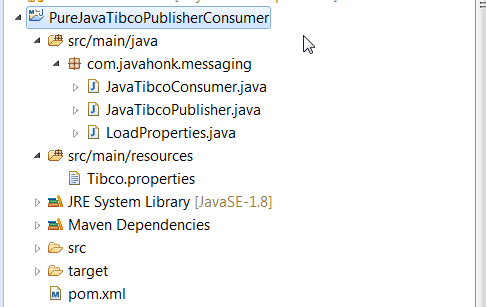Tibco Publisher Consumer Java Example
In last tutorial you saw how to integrate Tibco with Spring and create publisher consumer to send receive message on the queue. In this example I will show you basic simple java example to create publisher and consumer. To understand better I will create small maven project:
Tools needed:
- Eclipse 4.0 or above
- JDK 1.8
- JMS Version 1.1
- Tibco version 5.1.2
- Maven 3.1.2 or latest version
Maven project PureJavaTibcoPublisherConsumer structure:
- pom.xml to show what are dependencies are needed:
<?xml version="1.0" encoding="UTF-8"?>
<project xmlns="http://maven.apache.org/POM/4.0.0" xmlns:xsi="http://www.w3.org/2001/XMLSchema-instance"
xsi:schemaLocation="http://maven.apache.org/POM/4.0.0 http://maven.apache.org/xsd/maven-4.0.0.xsd">
<modelVersion>4.0.0</modelVersion>
<groupId>com.javahonk.purejavatibcopublisherconsumer</groupId>
<version>1.0-SNAPSHOT</version>
<artifactId>PureJavaTibcoPublisherConsumer</artifactId>
<properties>
<project.build.sourceEncoding>UTF-8</project.build.sourceEncoding>
<maven.compiler.source>1.8</maven.compiler.source>
<maven.compiler.target>1.8</maven.compiler.target>
<com.tibco.version>5.1.2</com.tibco.version>
<jms.version>1.1</jms.version>
</properties>
<dependencies>
<dependency>
<groupId>com.tibco</groupId>
<artifactId>tibjms</artifactId>
<version>${com.tibco.version}</version>
</dependency>
<dependency>
<groupId>javax.jms</groupId>
<artifactId>jms</artifactId>
<version>${jms.version}</version>
</dependency>
</dependencies>
</project>- LoadProperties.java: Class which load all properties from Tibco.properies file and keep all data in map and we will call method getPropKeyValue to get properties value wherever needed:
package com.javahonk.messaging;
import java.io.FileInputStream;
import java.io.IOException;
import java.io.InputStream;
import java.util.Enumeration;
import java.util.HashMap;
import java.util.Map;
import java.util.Properties;
public class LoadProperties {
private static Map<String, String> propKeyValue = new HashMap<>();
private static void getPropertyValue() {
Properties properties = new Properties();
InputStream input = null;
try {
input = new FileInputStream("src/main/resources/Tibco.properties");
properties.load(input);
Enumeration<?> enumeration =properties.propertyNames();
while (enumeration.hasMoreElements()) {
String keyVal = (String) enumeration.nextElement();
propKeyValue.put(keyVal, properties.getProperty(keyVal));
}
} catch (IOException ex) {
ex.printStackTrace();
} finally {
if (input != null) {
try {
input.close();
} catch (IOException e) {
e.printStackTrace();
}
}
}
}
public static String getPropKeyValue(String key) {
if (propKeyValue.get(key) == null) {
getPropertyValue();
return propKeyValue.get(key);
}else {
return propKeyValue.get(key);
}
}
}
- Tibco.properties: Here you could mentioned all Tibco related properties and replace these dummy value with your environment related actual values:
TIBCO_URL=tcp://javahonk.com:8222 PUB_USER_ID=javahonk PUB_PASS=javahonk SUB_USER_ID=javahonk SUB_PASS=javahonk TIBCO_QUEUE_NAMEjavahonk.Input
- JavaTibcoPublisher.java:
package com.javahonk.messaging;
import javax.jms.Connection;
import javax.jms.JMSException;
import javax.jms.MessageProducer;
import javax.jms.Queue;
import javax.jms.Session;
import javax.jms.TextMessage;
import static com.javahonk.messaging.LoadProperties.*;
import com.tibco.tibjms.TibjmsConnectionFactory;
public class JavaTibcoPublisher {
public static void main(String[] args) throws InterruptedException {
try {
TibjmsConnectionFactory factory = new TibjmsConnectionFactory(getPropKeyValue("TIBCO_URL"));
Connection connection = factory.createConnection(getPropKeyValue("PUB_USER_ID"), getPropKeyValue("PUB_PASS"));
Session session = connection.createSession(false, javax.jms.Session.AUTO_ACKNOWLEDGE);
Queue outputQueue = session.createQueue(getPropKeyValue("TIBCO_QUEUE_NAME"));
MessageProducer msgProducer = session.createProducer(outputQueue);
connection.start();
TextMessage msg = session.createTextMessage("Send message on Ticco queue.");
msg.setJMSType("Test.Data");
for (int i = 0; i < 15; i++) {
msgProducer.send(msg);
Thread.sleep(1000);
}
} catch (JMSException e) {
e.printStackTrace();
}
}
}
- JavaTibcoConsumer.java:
package com.javahonk.messaging;
import static com.javahonk.messaging.LoadProperties.getPropKeyValue;
import javax.jms.Connection;
import javax.jms.JMSException;
import javax.jms.Message;
import javax.jms.MessageConsumer;
import javax.jms.MessageListener;
import javax.jms.Queue;
import javax.jms.Session;
import javax.jms.TextMessage;
import com.tibco.tibjms.TibjmsConnectionFactory;
public class JavaTibcoConsumer implements MessageListener{
public static void main(String[] args) {
JavaTibcoConsumer javaTibcoConsumer = new JavaTibcoConsumer();
javaTibcoConsumer.startSubscriber();
}
private void startSubscriber() {
Queue outputQueue;
MessageConsumer msgConsumer;
try {
TibjmsConnectionFactory factory = new TibjmsConnectionFactory(getPropKeyValue("TIBCO_URL"));
Connection connection = factory.createConnection(getPropKeyValue("SUB_USER_ID"), getPropKeyValue("SUB_PASS"));
Session session = connection.createSession(false, javax.jms.Session.AUTO_ACKNOWLEDGE);
outputQueue = session.createQueue(getPropKeyValue("TIBCO_QUEUE_NAME"));
msgConsumer = session.createConsumer(outputQueue);
msgConsumer.setMessageListener(this);
connection.start();
} catch (JMSException e) {
e.printStackTrace();
}
}
@Override
public void onMessage(Message msg) {
try {
TextMessage txtMsg = (TextMessage) msg;
System.out.println("Received response: "+txtMsg.getText());
System.out.println("Message type: "+msg.getJMSType());
System.out.println("Message details: "+txtMsg);
} catch (Exception e) {
e.printStackTrace();
}
}
}
Reference:
Download project:PureJavaTibcoPublisherConsumer

